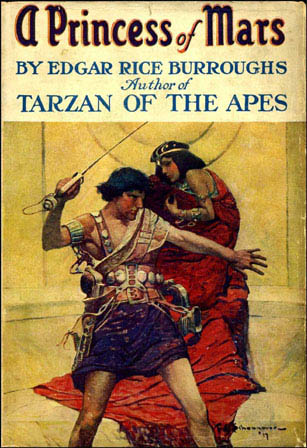John Carter (character)
John Carter first appeared in A Princess of Mars, the first Burroughs novel set on the fictionalized version of Mars that the author dubbed "Barsoom." Written between July and September 28, 1911, it was serialized as Under the Moons of Mars in the February to July 1912 issues of the magazine All-Story and first published in book form in October 1917.
What fans may forget is that A Princess of Mars is bookended with savage Indians. At the beginning, Carter and his partner Powell are prospecting for gold in the Arizona hills. Carter narrates:
Powell, I knew, was well armed and, further, an experienced Indian fighter; but I too had lived and fought for years among the Sioux in the North, and I knew that his chances were small against a party of cunning trailing Apaches. Finally I could endure the suspense no longer, and, arming myself with my two Colt revolvers and a carbine, I strapped two belts of cartridges about me and catching my saddle horse, started down the trail taken by Powell in the morning.
The little stretch of level land was white with Indian tepees, and there were probably half a thousand red warriors clustered around some object near the center of the camp. Their attention was so wholly riveted to this point of interest that they did not notice me, and I easily could have turned back into the dark recesses of the gorge and made my escape with perfect safety. The fact, however, that this thought did not occur to me until the following day removes any possible right to a claim to heroism to which the narration of this episode might possibly otherwise entitle me.
Carter rescues Powell's body, which is "fairly bristling with the hostile arrows of the braves," and flees into the hills. He hides in a mysterious cave but the Apaches find him:
The fellow, instead of approaching, merely stood and stared; his eyes bulging and his jaw dropped. And then another savage face appeared, and a third and fourth and fifth, craning their necks over the shoulders of their fellows whom they could not pass upon the narrow ledge. Each face was the picture of awe and fear, but for what reason I did not know, nor did I learn until ten years later. That there were still other braves behind those who regarded me was apparent from the fact that the leaders passed back whispered word to those behind them.
Suddenly a low but distinct moaning sound issued from the recesses of the cave behind me, and, as it reached the ears of the Indians, they turned and fled in terror, panic-stricken. So frantic were their efforts to escape from the unseen thing behind me that one of the braves was hurled headlong from the cliff to the rocks below. Their wild cries echoed in the canyon for a short time, and then all was still once more.
Behind her, depending from the roof upon rawhide thongs, and stretching entirely across the cave, was a row of human skeletons. From the thong which held them stretched another to the dead hand of the little old woman; as I touched the cord the skeletons swung to the motion with a noise as of the rustling of dry leaves.
It was a most grotesque and horrid tableau and I hastened out into the fresh air; glad to escape from so gruesome a place.
What do we have here? Let's see:
The descriptions of the Apache as cunning, savage, merciless torturers are par for the course. They may even have some validity. But note what Carter doesn't say. He doesn't claim he had the right to be in Apache territory. Presumably he didn't ask the Apaches' permission. He simply entered the land and began extracting its riches because of his white privilege. To Anglo-Americans of that era, taking was almost as common as breathing.
Note also Carter's history. He fought as a Confederate soldier to preserve slavery. He fought and presumably killed the Sioux. He admits he's "not prone to sensitiveness," which is putting it mildly. He seems to be insensitive to anyone who isn't white like him.
Despite this criticism, A Princess of Mars was one of my favorite books when I was growing up. I probably would've put it in my personal top 10. I haven't read it in ages, but I'd still give it a solid 8.0 of 10.
For more on the subject, see The Best Indian Books.


1 comment:
It's Burroughs. Pretty much any science fiction writer from the early 20th century is generally a racist. The worst was probably Robert E. Howard; the entire cosmology of the Conan series is based on Aryan supremacy. Of course, so was Tarzan's premise, so it's hard to tell which one was more racist.
Post a Comment